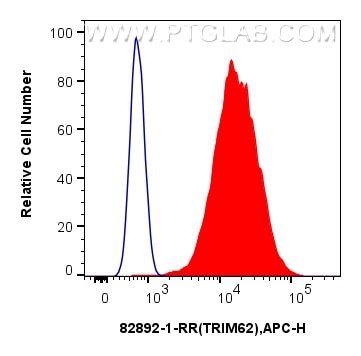Anticorps Recombinant de lapin anti-TRIM62
TRIM62 Recombinant Antibody for FC, ELISA
Hôte / Isotype
Lapin / IgG
Réactivité testée
Humain
Applications
FC, ELISA
Conjugaison
Non conjugué
CloneNo.
230195G5
N° de cat : 82892-1-RR
Synonymes
Galerie de données de validation
Applications testées
| Résultats positifs en cytométrie | cellules HeLa, |
Dilution recommandée
| Application | Dilution |
|---|---|
| Flow Cytometry (FC) | FC : 0.13 ug per 10^6 cells in a 100 µl suspension |
| It is recommended that this reagent should be titrated in each testing system to obtain optimal results. | |
| Sample-dependent, check data in validation data gallery | |
Informations sur le produit
82892-1-RR cible TRIM62 dans les applications de FC, ELISA et montre une réactivité avec des échantillons Humain
| Réactivité | Humain |
| Hôte / Isotype | Lapin / IgG |
| Clonalité | Recombinant |
| Type | Anticorps |
| Immunogène | TRIM62 Protéine recombinante Ag7143 |
| Nom complet | tripartite motif-containing 62 |
| Masse moléculaire calculée | 54 kDa |
| Numéro d’acquisition GenBank | BC001222 |
| Symbole du gène | TRIM62 |
| Identification du gène (NCBI) | 55223 |
| Conjugaison | Non conjugué |
| Forme | Liquide |
| Méthode de purification | Purification par protéine A |
| Tampon de stockage | PBS avec azoture de sodium à 0,02 % et glycérol à 50 % pH 7,3 |
| Conditions de stockage | Stocker à -20°C. Stable pendant un an après l'expédition. L'aliquotage n'est pas nécessaire pour le stockage à -20oC Les 20ul contiennent 0,1% de BSA. |
Informations générales
TRIM62(Tripartite motif-containing protein 62) belongs to the TRIM/RBCC family. TRIM proteins are involved in a broad range of biological processes, including some that underlie genetic disorders, neurological disorders and cancers. TRIM62 is shown to promote the release of HIV from infected cells, and a TRIM62 protein that has a mutation in its RING domain was more active than the native protein in promoting HIV release(PMID:18836477).
Protocole
| Product Specific Protocols | |
|---|---|
| FC protocol for TRIM62 antibody 82892-1-RR | Download protocol |
| Standard Protocols | |
|---|---|
| Click here to view our Standard Protocols |


